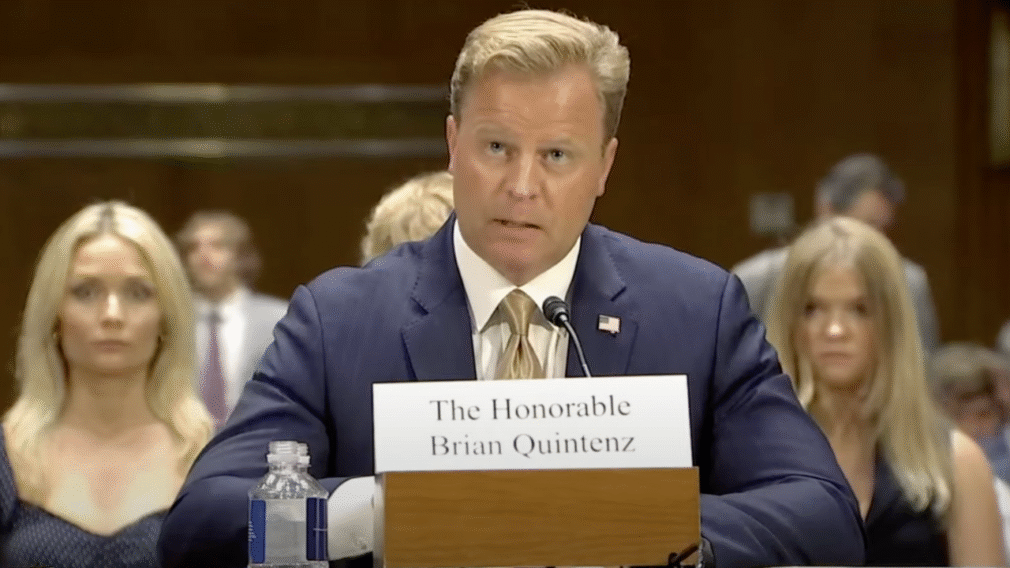Quintenz Defends Prediction Markets, Pledges Crypto Clarity at CFTC Senate Hearing
Brian Quintenz, Trump’s pick for CFTC chair, told senators that prediction markets are legitimate hedging tools and crypto needs clear rules.

A High-Stakes Hearing
Yesterday, Brian Quintenz faced the Senate Agriculture, Nutrition, and Forestry Committee to defend his nomination as Commodity Futures Trading Commission (CFTC) chair.
Nominated by President Donald Trump in February, the former CFTC commissioner from 2017 to 2021 pitched a vision of innovation-friendly regulation during the 49-minute session. “The CFTC is at its most exciting moment,” Quintenz said, eyeing expanded oversight of crypto and prediction markets.
Senators grilled him on conflicts of interest, tribal sovereignty, and the CLARITY Act. His pro-market stance sparked both praise and pushback.
Backing Prediction Markets
Quintenz strongly endorsed prediction markets, arguing the Commodity Exchange Act (CEA) clearly supports them. “The law is very clear about events that have commercial, financial, or economic consequence qualifying as commodities,” he told Senator Adam Schiff, emphasizing their role in “risk management, price discovery, and price dissemination.”
Responding to Senator Tommy Tuberville, he said events pose risks like commodity prices, and markets offer “new methods for individuals to hedge risks” that Wall Street’s complex products can’t match.
He cited the 2000 Commodity Futures Modernization Act, which recognized events as commodities, enabling targeted hedging. Quintenz promised a roundtable to discuss prediction markets, saying, “I’d be happy to reschedule it” after a prior cancellation, but added, “I don’t have plans to issue any guidance in the near term.”
Rejecting Gambling Concerns
Senator Schiff called prediction markets “difficult to distinguish from gambling” and a threat to tribal sovereignty, citing California tribes’ exclusive gaming rights under the Indian Gaming Regulatory Act.
Quintenz countered that the CEA governs these markets, and any conflict “is best resolved through Congress.” He noted, “Nothing in the CEA prohibits tribes from offering those products,” if CFTC-approved.
Asked by Schiff if he’d halt markets deemed illegal gambling by courts, Quintenz said, “The agency will follow the appropriate court mandate.” He resisted being a “value judgment regulator,” insisting Congress, not the CFTC, should set limits.
“The statute is very clear,” he told Senator Cory Booker, who quoted Quintenz’s past claim that “all events are commodities” due to economic impacts, which Quintenz confirmed applies to interstate contracts.
Navigating Tribal and State Tensions
Quintenz’s stance worried tribal groups, with Nevada, New Jersey, and Maryland suing Kalshi, a prediction market platform where he serves on the board, over sports event contracts.
Schiff pressed on tribal sovereignty, but Quintenz maintained the CEA preempts state gaming laws for futures markets. “The agency would want to ensure it is appropriately defending the Commodity Exchange Act,” he said.
He pledged a “robust, all-stakeholder engagement process” to hear tribal concerns but showed no intent to restrict market growth absent congressional action.
Crypto Regulation and the CLARITY Act
Quintenz pushed for clear crypto rules, leveraging his role as Andreessen Horowitz’s crypto policy head. “It is time for a comprehensive regulatory framework for crypto assets,” he said in written remarks.
He backed the CLARITY Act, introduced May 29 by Representative French Hill, which would make the CFTC the primary crypto regulator, clarifying its jurisdiction over Bitcoin and Ethereum versus the SEC’s.
“If Congress gives authority to the CFTC to regulate spot digital commodity markets exclusively, the CFTC is more than up for that mandate,” he told senators.
He warned the CFTC’s $365 million budget, dwarfed by the SEC’s $2.4 billion, needs a boost to handle expanded duties, saying, “The federal agency would likely need more resources and staff.”
Addressing Conflicts of Interest
Quintenz’s $3.4 million in assets, including Kalshi stock and Andreessen Horowitz crypto funds, drew scrutiny. Senators Schiff and Booker flagged his Kalshi board role and Donald Trump Jr.’s advisory position there. “I can certainly understand,” Quintenz said, acknowledging concerns.
He pledged to resign from Kalshi, divest all relevant assets within 90 days of confirmation, and recuse himself from Kalshi matters for one year and from Andreessen Horowitz for two.
Bipartisanship and Debanking
Senators Tina Smith and Raphael Warnock pressed Quintenz on maintaining the CFTC’s bipartisan balance, as law caps commissioners from one party at three.
With only acting chair Caroline Pham and Kristin Johnson remaining, both set to exit, Quintenz dodged direct commitments. “I don’t tell the president what to do,” he told Warnock, disappointing Smith, who called his answer “disappointing.”
On debanking, Tuberville asked about his Andreessen Horowitz experience, where crypto firms struggled to open bank accounts. “Our firm couldn’t even send them a check,” Quintenz said. He called crypto “a global computer that makes transparent commitments.”
Quintenz’s confirmation, if approved, would reshape the CFTC amid a leadership vacuum, with four commissioners gone by late 2025.
His pro-market, pro-crypto stance aligns with Trump’s agenda. For now, his vision of a tech-driven CFTC awaits Senate approval, with markets watching closely.
Recommended
